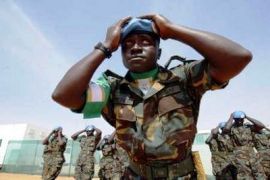Darfur hybrid peacekeeping force faces grim prospects
December 31, 2007 (EL FASHER) — A joint African-United Nations force took over peacekeeping duties in war-torn Darfur Monday, a long awaited step intended to be the strongest effort yet to solve the world’s worst humanitarian crisis.

But many are already warning that its prospects are grim, and that if it fails, the 4 1/2-year conflict, which has already killed 200,000 people and driven some 2.5 million from their homes, will only worsen.
The force – at 9,000 soldiers and policemen – is only a little larger than the beleaguered and ineffectual African Union peacekeeping mission it replaces. Even in a best case scenario, it will take months to build up to its planned strength of 26,000.
Western nations haven’t come through with equipment like military helicopters and vehicles the U.N. says are vital for the new force to reach hotspots quickly and protect civilians. The Sudanese government, meanwhile, has thrown up numerous obstacles to the deployment.
Monday’s handover ceremony at the new mission’s still unfinished headquarters outside El Fasher, capital of North Darfur state, was low key.
The A.U. force’s military commander, Gen. Martin Agwai, took off his green African Union beret and donned one with the blue U.N. colors, becoming the commander of the new force, known as UNAMID. The troops on hand for the ceremony – most of them from the previous A.U. force – did the same.
“We are determined to deploy the most robust force possible,” U.N. Secretary-General Ban Ki-moon said in a statement to the ceremony read by UNAMID’s top chief, Rodolphe Adada. “If we are to have a real impact on the situation on the ground within the first half of 2008, these deployments must happen far more swiftly than they have done so far.”
Ban chided nations for not pledging aircraft and ground transport. He also said he expects the Sudanese government to “work constructively with the U.N. and A.U.”
The Darfur conflict has pitted ethnic African rebels against the military of the Arab-dominated Khartoum government. Arab militias allied to the government, known as janjaweed, are accused of a campaign of atrocities against ethnic African civilians, attacking villages and raping women.
The fighting has only grown more complicated over the past year, with rebel groups splintering. Since a deadly rebel attack on an AU base in November, the under-equipped A.U. troops have largely stayed in their camps, all but giving up on most basic peacekeeping missions, such as protecting women from being raped by janjaweed when they trek out to collect firewood.
Attacks on international aid workers increased 150% over 2007, and violence has made large areas inaccessible to humanitarian relief, according to the U.N.
The U.N. and Western nations have hoped that deploying a strongly equipped UNAMID force could finally put some firepower behind attempts to protect civilians and prevent violence.
But even before Monday’s deployment, U.N. peacekeeping chief Jean-Marie Guehenno warned that the force could be a failure.
“Do we move ahead with the deployment of a force that will not make a difference, that will not have the capability to defend itself and that carries the risk of humiliation?” Guehenno asked the Security Council in late November.
As it stands, UNAMID forces consist of the around 7,000 troops who made up the A.U. mission, augmented by 800 U.N.-affiliated personnel and 1,200 policemen.
A.U. spokesman Noureddine Mezni said additional troops from Egypt, Ethiopia and other countries were expected to arrive by mid-January, but he couldn’t say how many.
Building UNAMID up to its full strength of 26,000 “will take some months,” he said.
Thomas Cargill, an Africa expert at London’s Chatham House foreign affairs think-tank, said UNAMID could make a difference if it can deploy fully and if it has the right support.
“But those are two big ifs,” he said. “The disconnect between what the permanent members of the Security Council say they want to happen in Darfur and what is actually happening is very wide.”
(AP)
